The demand for reliable and efficient cloud storage solutions has never been higher in the digital age. Whether you’re a professional needing to back up critical work documents or someone simply looking to keep personal photos and videos safe, choosing the right cloud storage service is essential.
To help you navigate this dynamic field, we’ve compiled a list of the top 7 best cloud storage options available this year, each offering unique benefits tailored to meet your specific needs. Let’s dive in and explore the best choices for securing your digital life.
What Makes The Best Cloud Storage?
Amount of Storage
More storage isn’t always better. Consider factors like monthly transfer limits, the types of files allowed, and how storage is allocated.
Competitive Pricing
Cheap can be deceiving. Opting for the app with the most GBs for the lowest price isn’t always the best choice. Why pay for excess storage when features that save you time may be more valuable?
Offline and Multi-Device Access
Ensure you can access your files whenever and wherever you need them, across all your devices—whether you’re at home or in the middle of nowhere.
Organization Tools
Top cloud storage platforms provide tools to help you easily sort, filter, search, and organize your files.
Security and Reliability
Security is crucial for protecting sensitive information. While price is important, security often ranks just as high for most users.
Also read: Cloud Storage 101: What You Need To Know
Top 7 Best Cloud Storage In 2024
#1 Google Drive_Best for Android and Google Workspace Users
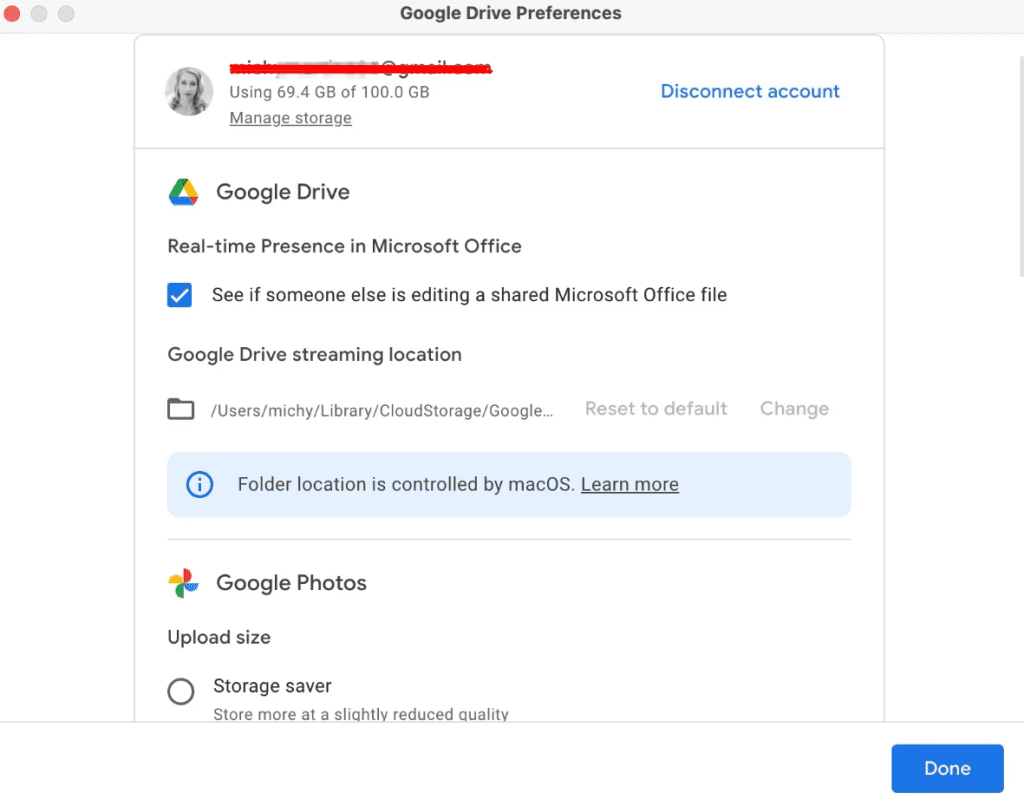
Google Drive Pros:
– Integrated with Android devices, including automatic photo backup
– Store files in the cloud and access them from any device to save hard drive space
– Supports storage for Google Docs, Sheets, Slides, and other Google Workspace files
Google Drive Cons:
– Mandatory use if you use Google Workspace
Google Drive is a go-to choice for Android users, providing automatic photo backups and seamless integration with Google Workspace. It lets you store files in the cloud, freeing up hard drive space and allowing access from any device. This makes it an excellent tool for managing Google Docs, Sheets, Slides, and other Workspace files efficiently.
However, if you use Google Workspace, you’re essentially required to use Google Drive, which might not be ideal for everyone.
Google Drive pricing:
- Get 15GB for free.
- Paid plans
- Drive storage alone: $1.99/month for 100GB, $2.99/month for 200GB, $9.99/month for 2TB.
- Google Workspace: $6/month for 30GB, $12/month for 2TB, $18/month for 5TB
#2 iCloud_Best for Apple Users
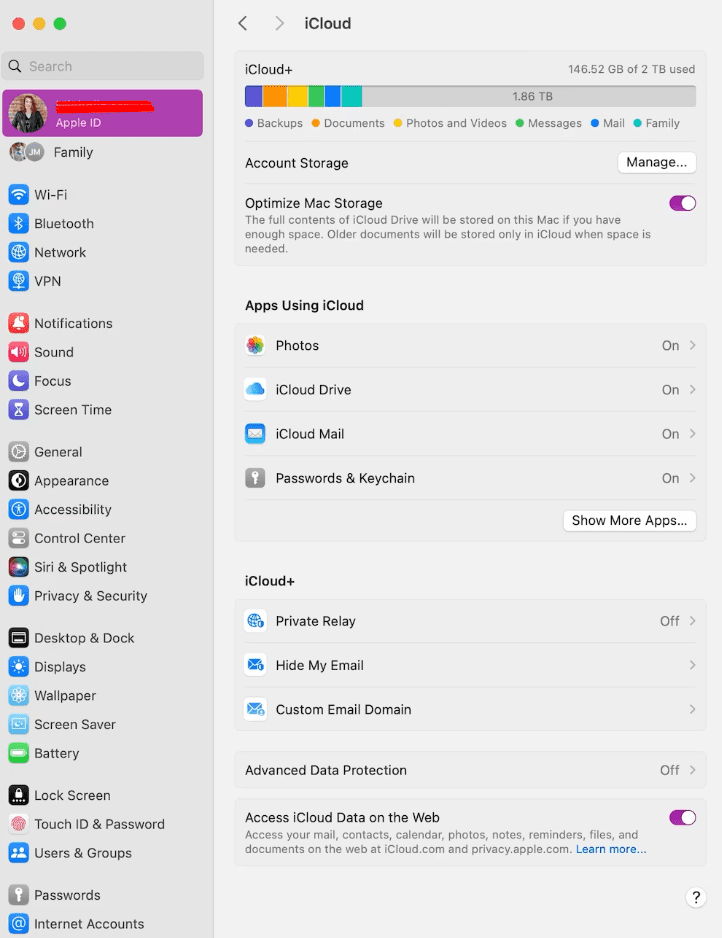
iCloud pros:
– Effortlessly syncs with all Apple devices
– Requires no upkeep; functions flawlessly
iCloud cons:
– Photos consume most of your storage
– Not compatible with non-Apple platforms (like Windows PCs, Android phones, etc.)
As a cloud storage service, iCloud seamlessly integrates into all Apple devices without requiring any app installations or updates. It operates silently in the background, perfectly syncing your data without ever sending you notifications.
Moreover, iCloud is among the few cloud storage providers that offer substantial storage plans, with options of 6TB and 12TB now available. That’s a significant amount of storage. If you’re using that much, it might be more cost-effective to set up a NAS or other local storage solutions. However, if simplicity and ongoing use of Apple devices are your main concerns, iCloud is the ideal choice.
iCloud pricing:
- Get 5GB for free.
- Paid plans
- $0.99/month for 50GB
- $2.99/month for 200GB
- $9.99/month for 2TB
- $29.99/month for 6TB
- $59.99/month for 12TB.
- Family sharing plans for up to 6 users are $3.99/month for 200GB and $12.99/month for 2TB.
#3 OneDrive_Best for Windows and Microsoft 365 Users
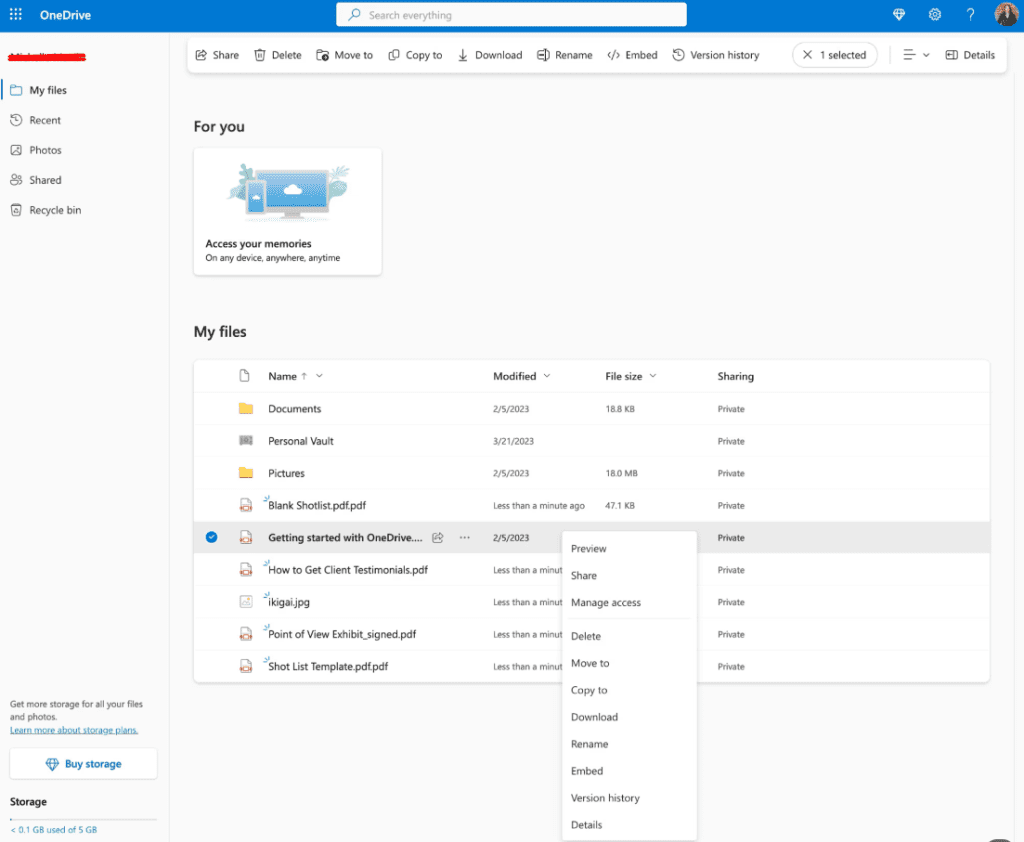
OneDrive Pros:
– Integrated with Microsoft/Windows devices and cross-platform on macOS and iOS
– Organized photo library and galleries
OneDrive Cons:
– Limited storage space; maximum 1TB per person on the 6TB plan
For Microsoft Office users, OneDrive is a natural choice, allowing you to work on Word, PowerPoint, and other files from anywhere. Its deep integration with Windows adds convenience, but it also functions smoothly on Mac and iOS. The desktop, web, and mobile apps are all user-friendly and well-organized. Plus, its pricing is comparable to iCloud.
A standout feature for many users is the newly redesigned Photos tab. It automatically sorts your photos into categories like screenshots and selfies, presenting them in an appealing gallery format, much like Apple Photos.
OneDrive Pricing:
- Get 5GB for free.
- Paid plans
- $1.99/month for 100GB
- $6.99/month for 1TB
- $9.99/month for 6TB (shared with 6 users, split 1TB each).
#4 Dropbox_Best for Low-Maintenance Syncing
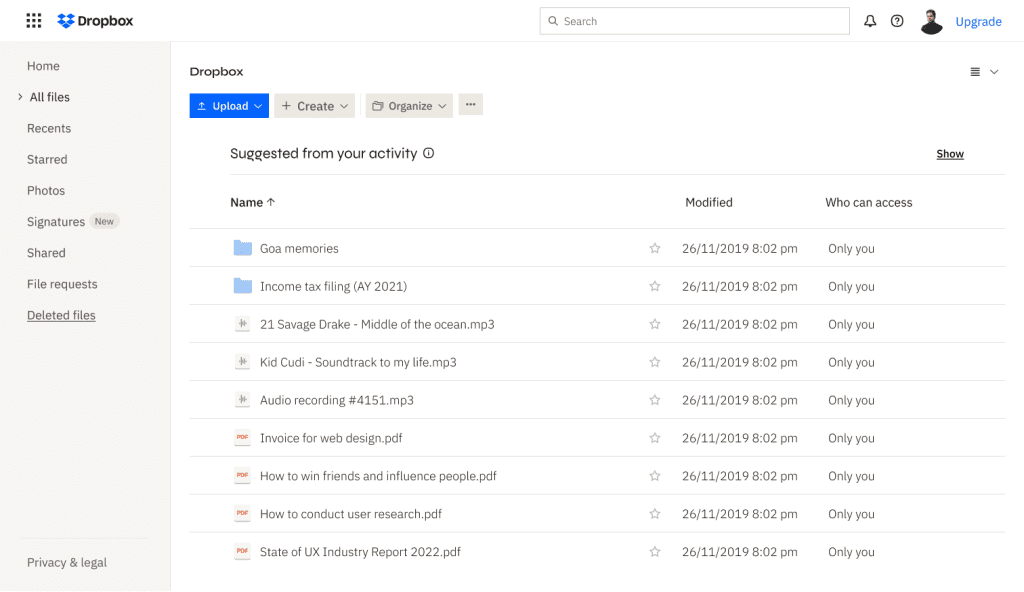
Dropbox Pros:
– Reliable, low-maintenance app that works seamlessly
– Full support across multiple platforms
Dropbox Cons:
– Discontinued the 2TB shareable family plan in 2024
– Less competitively priced compared to other options
Dropbox’s premium plans come with many attractive features, such as image watermarking, a built-in password manager, and remote data wipe options in case of device theft. Whether you use Mac or Windows, the app runs automatically in the background.
Dropbox pricing:
- Get 2GB for free.
- Paid plans
- $11.99/month for 3TB.
- Various business plans start at $54/month for 3 users and 5TB.
#5 Box_Best for Small Businesses Seeking a Google Workspace Alternative
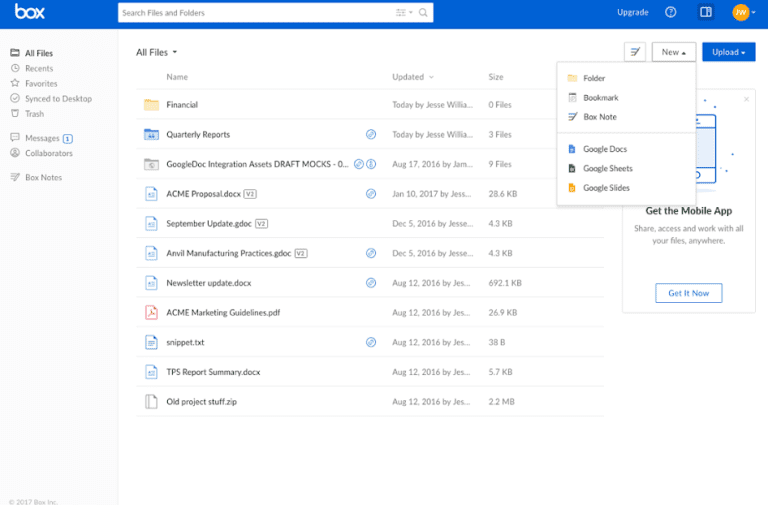
Box Pros:
– Practically unlimited storage for $60/month
– Comes with small business tools like document signing, collaborative online documents, and whiteboarding
Box Cons:
– Unlimited storage is capped at 5GB per file
– Competitive pricing only at higher storage tiers
Box’s basic unlimited storage plan has a 5GB per file limit, which is usually sufficient, but not ideal for backing up videos, especially since iPhones can record 6GB per minute of 4K video. Higher Box tiers allow up to 150GB per file, but there are more cost-effective apps at that price point.
Editing Box Notes (text documents) on mobile is quick and easy, making it an excellent on-the-go note-taking solution that syncs automatically across devices, or a content creation hub for small businesses. File comments are easy to read and reply to, facilitating effortless collaboration anywhere. Box also offers Canvas, a virtual whiteboard perfect for personal or team brainstorming.
These features, along with Box Sign for document signatures, make Box a strong choice for freelancers and small businesses—provided you don’t need to store a lot of videos or large individual files.
Box pricing:
- Get 10GB for free.
- Paid plans range from $14/month for 100GB to $60/month (minimum 3 users at $20/each) for unlimited storage with a Business account.
#6 iDrive_Best for Effortless Backup
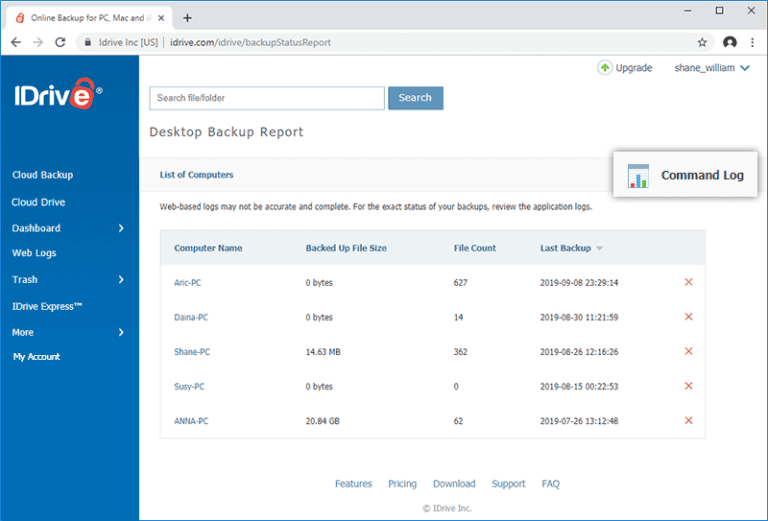
iDrive Pros:
– Comprehensive backup solution, including physical drive shipments
– Affordable storage up to 100TB
iDrive Cons:
– Data privacy compliance is guaranteed only with Team and Business plans
iDrive is a versatile and budget-friendly cloud storage app that caters to almost every need. It can automatically back up devices like NAS drives, mobile phones, and computers, store anything in the cloud, and sync across devices seamlessly.
It’s essential to differentiate between cloud storage and cloud backup. Cloud storage involves transferring files or folders individually to the cloud. In contrast, cloud backup means automatically backing up an entire device in the background, including versioning and cloning, allowing for a one-click restoration in case of a hard drive crash. iDrive excels in both areas. If your hard drive fails, iDrive can ship you a physical drive of your backup, enabling you to restore your device without using data bandwidth.
iDrive continuously scans all connected devices for new changes and backs up those files, whether it’s your computer, networked drives like a NAS system, or an external hard drive.
iDrive Pricing:
- Get 10GB for free.
- Paid plans
- $9.95/month for 5TB, $14.95/month for 10TB
- $24.95/month for 20TB
- $49.95/month for 50TB
- $99.95/month for 100TB.
#7 Internxt_Best for The Highest Security
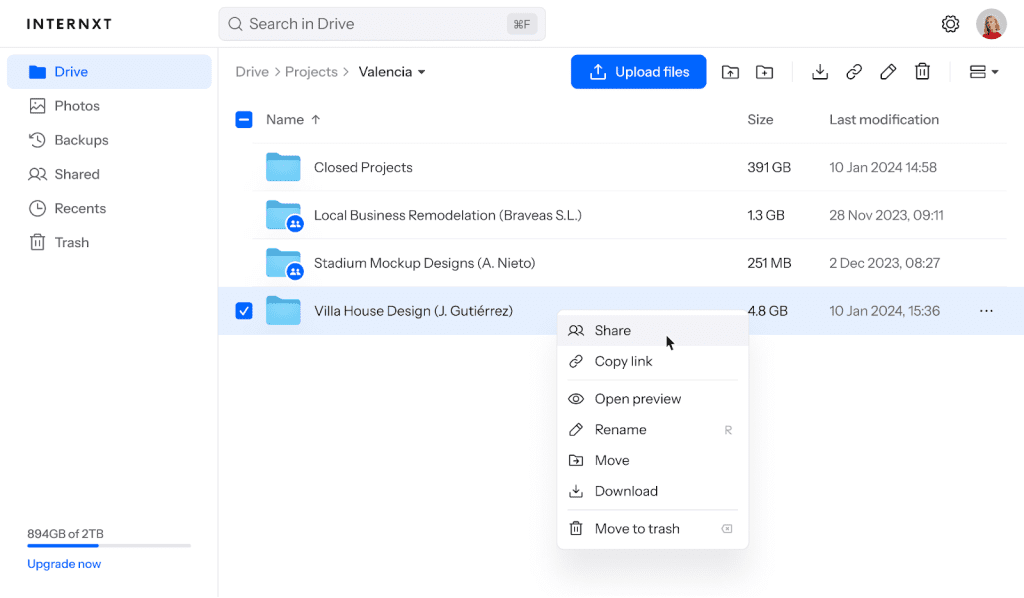
Internxt Pros:
– Enhance data privacy effortlessly, without requiring technical expertise.
– Dedicated section for photo backups, complete with organized gallery views.
Internxt Cons:
– The cost per TB is higher compared to other cloud storage options.
Internxt features a sleek, user-friendly design reminiscent of Dropbox, with cross-platform apps that are easy to navigate. It prioritizes data privacy with key features like zero-knowledge AES-256 encryption, open-source software, and secure file sharing and transfers. Additionally, it offers a dedicated space for backing up and viewing photos across all your devices, protected by military-grade encryption.
If you agree that privacy should be a fundamental right rather than a luxury, Internxt might be the ideal cloud storage solution for you.
Internxt pricing:
- Get 10GB for free.
- Paid plans:
- $5.49/month for 200GB
- $10.99/month for 2TB
- $22.99/month for 5TB
- $34.99/month for 10TB.
Consider Digital Transformation Consulting?
As more companies start the next wave of digital transformation, navigating the landscape of implementing emerging technologies can pose a challenge. This is where the benefits of seeking guidance from experts through consulting services become evident.
Collaborating with experienced consultants allows businesses to fully realize the advantages of cloud computing, steering clear of common pitfalls and establishing a foundation for future success.
An AWS Advanced Tier Services Provider, such as CMC Global, plays a crucial role in evaluating readiness, offering technology recommendations, addressing potential risks, and ensuring a smooth implementation of cloud solutions. This, in turn, empowers businesses to unlock the complete potential of this transformative technology.

The CMC Global team is available to assist with:
- Assessing business needs and readiness
- Developing customized roadmaps
- Evaluating and recommending technologies
- Formulating data strategies and preparation
- Providing guidance on team building and resources
- Assessing and mitigating risks
- Establishing governance and compliance standards
- Continuously evaluating and improving processes.
Contact us now for further consultation!
Did this article help you understand the basics of cloud storage? Let us know on Linked as we’d love to hear from you.




